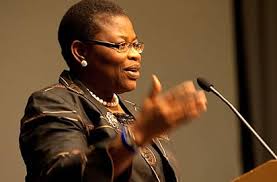The Presidential Candidate of the Allied Congress Party of Nigeria (ACPN), Mrs Obiageli Ezekwesili, said on Monday that the latest rejection of the Electoral Act Amendment Bill by President Muhammadu Buhari is an assault on the country’s democracy.
Ezekwesili wants the President to rescind his decision, warning that it was capable of destabilising the country.
She spoke at a press conference in Abuja on Monday.
According to her, “As a candidate in the 2019 election for the Office of the President of the Federal Republic of Nigeria, I have called this emergency press conference in order to let the world know that President Buhari’s action is contrary to the tenets of our democracy.”
“President Muhammadu Buhari is, therefore, called upon to immediately reconsider his latest, fourth, rejection of the Electoral Amendment Bill 2018 that was transmitted to him by the National Assembly to be signed into law.”
President Buhari had rejected the bill for a fourth time last week, saying among other things that signing the bill into law so close to the country’s general elections might cause confusion and lead to the disruption of the polls.
In a letter dated December 6, he asked the National Assembly to make some adjustments to the bill and specify that the amendments to the Act would come into effect and be applicable to elections commencing after the 2019 polls.
But Ezekwesili rejected the President’s reasons for withholding his assent to the bill and urged all Nigerians to do the same.
“Ladies and gentlemen, the excuses of the President for not completing the process that will give Nigeria one of the soundest electoral laws in the world is an assault on our democracy and must be rejected roundly by all Nigerians,” she said.
“Mr President is dangerously setting up the country and the people for political destabilisation in 2019. Nothing of the excuses of President Muhammadu Buhari that there are observed errors when he, for the fourth time, sent the bill back to the National Assembly has any iota of credibility nor evidential persuasion for the Nigerian electorate.”














